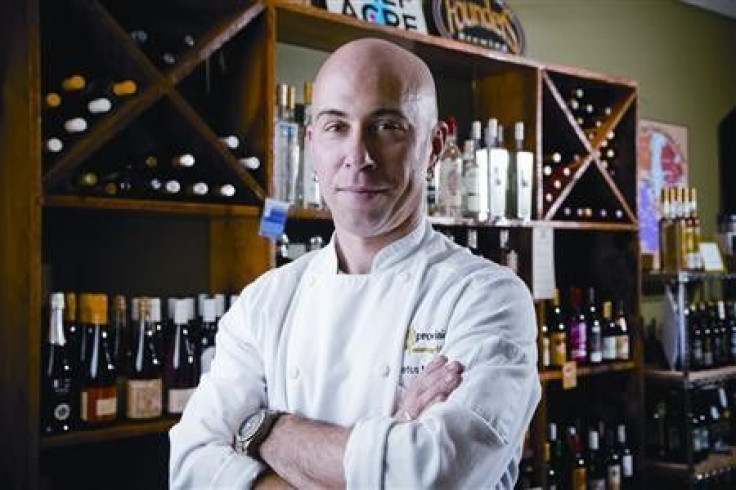Healthy food startups avoid recession's bite

Cleetus Friedman is convinced consumers will continue to pay a premium for healthier, locally sourced food, despite the sluggish economy that has many watching their wallets.
"You're not paying $12 for a sandwich, you're paying for an experience," said Friedman, who runs a Chicago-based catering company, City Provisions (www.cityprovisions.com), where he makes his own smoked meats, condiments, organic desserts and fresh cocktails. "Everything is made by hand from farm-fresh products."
The effort requires constant education of staff and customers alike. But Friedman has survived the downturn, all the while learning to be more selective about new business, willing to turn away catering clients that won't pay enough for him to make a profit.
"If you're doing a wedding and you have $50 a person (budget)… that's not going to work for me," Friedman said, adding he targets food-savvy clients who understand the importance of fresh, local ingredients and are willing to pay for it. "When you put everything in - food and drinks - you're probably going to be $150 to $200 a person. Is that 20 percent more than competitors? Probably."
Friedman launched his catering firm in 2008, just as the recession was taking hold. He managed to land some funding to add an upscale storefront deli in 2010, building more awareness for his products and additional revenue.
"Our mission is to connect our community with food," said Friedman, 40, a vocal advocate for sustainable eating. "Local artisans, brewers, winemakers, cheesemakers, distillers - we know who makes it, where it comes from."
ORGANIC GROWTH
Food startups like Friedman's play to consumers' desire to know their purveyors up close and personal.
"The natural products industry has actually done quite well in the last two years," said David Browne, a senior analyst with the market research firm Mintel, noting improvement despite pressures on consumer spending.
Consumers buying these products, he said, are more affluent and "generally more committed to the category because they see it as a lifestyle. They're going to cut corners in other places," he said.
While still just a fraction of the overall market, sales of organic products at retail continue to outpace those of conventional items. According to the Organic Trade Association, organic food sales rose 8 percent in 2010, while total food sales were up less than 1 percent.
Barriers to entry for newcomers have dropped, with off-the-grid distribution channels such farmers' markets and food trucks cropping up more frequently and offering restaurant and retail entrants affordable venues to get in front of new audiences.
"You've got a lot of food entrepreneurs who simply cannot afford high retail rents," said Kate Manchester, a spokeswoman for Edible Communities (www.ediblecommunities.com), the growing locally licensed magazines that highlight sustainable foods. "Often the farmers' markets can serve as an incubator."
HOT SECTOR
Investors have taken note. Many are on the hunt for scalable concepts that serve up natural and organic products.
"Our entire portfolio is slanting toward organic and premium," said Dan Rowe, founder of Fransmart, a franchise development firm that invests in startups. "It's probably the hottest thing in the restaurant and franchise space right now."
Elevation Burger, one of several health-oriented chains Fransmart is backing, offers burgers made from 100-percent organic, grass-fed beef. Since opening its first franchise two years ago, the Falls Church, Virginia business has grown to more than 20 locations, with some 200 more in development.
"They absolutely thrived during the recession," Rowe said.
That has not been the same experience for Newark, California-based natural and organic baked goods manufacturer, FullBloom Baking Co. The 22-year-old business has endured slower growth since relocating to a new facility in 2007.
FullBloom (www.fullbloom.com), which mostly sells its all-natural oat bars, muffins, scones and cookies to large grocery chains like Whole Foods, has seen a pushback against its pricing since the downturn.
"It's been brutal, just brutal," said founder and CEO, Karen Trilevsky who has reduced prices by as much as 20 percent, while being hit with rising costs for key ingredients such as butter. "That doesn't mean the cost of the item is 20 percent more."
Without a doubt, there are still many cost pressures on startups in this niche of the food sector, said Karen Burns, a San Francisco-based accountant who specializes in manufacturing and counts food businesses, including FullBloom, among her clients.
They rely on pricier ingredients such as organic meats and produce at a time when basic commodities such as dairy and wheat have been escalating. Among the keys to success, she said, are keeping the menu of offerings simple and playing up credible health claims whenever possible.
"If you can promote your products with these benefits, often you can demand a higher price," said Burns, adding that successful startups often find multiple channels to sell product, including retail and food service. "People are really reading labels now."
Back in Chicago, Friedman remains focused on educating the public. Even so, not everyone understands what goes into the making of sustainable foods. He sometimes finds himself exacerbated by reviews on sites such as the online consumer forum Yelp, where some customers focus solely on price, comparing his artisanal foods to conventional offerings.
"When people walk into my shop they understand they're supporting a small business and they're okay with it," Friedman said. "We choose our battles as a society."
© Copyright Thomson Reuters 2024. All rights reserved.











